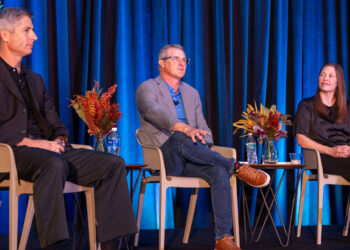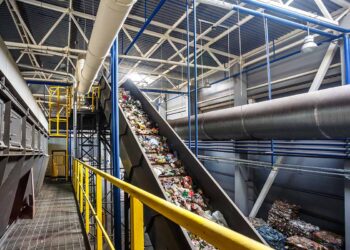A tight labor market, aging equipment, an evolving ton and difficult recyclables markets have spurred a Michigan county to upgrade its MRF. Robots are among the technologies to be installed.
Emmet County is upgrading the container line at its dual-stream facility, adding three robotic sorters, a glass system and other equipment. The project is estimated at about $1.8 million.
Located in the northwestern corner of lower Michigan, near the “tip of the mitt,” as the region is dubbed, the MRF provides recycled material sorting and marketing services for four counties and private haulers. Covering about 100,000 people, the MRF sold over 7,000 tons of material in 2018. Resource Recycling magazine highlighted the county’s program in its Community Spotlight feature in January 2017.
A recent grant application submitted by the county to the state and an interview with the county public works director provided details on the project impetus, technology costs and financing.
Addressing industry wide problems
In its application, the Emmet County Department of Public Works notes several long-term trends.
Emmet County is experiencing a tightening labor market, as is the case across the country. The organization Straits Area Services provides a crew of developmentally disabled adults who do much of the container sorting. But neither that nonprofit group nor contract-worker agencies have been able to provide enough labor.
The upgrade will replace container line sorters with robots. Those human sorters can be moved to the presort area, which will be lengthened to more than double the number of positions, said Andi Shepherd, director of the Emmet County Department of Public Works. That will allow the facility to continue operating if it’s short of people.
“Although we do have labor shortages, we do pride ourselves on creating jobs in the area, so we don’t want to cut all jobs and be fully automated,” she said.
Additionally, despite the fact the county’s dual-stream collection system results in high-quality materials, the post-National Sword markets have lowered commodity values, reducing MRF sales revenues “substantially,” according to the grant application.
Lastly, using refurbished equipment, the facility began operating nearly a decade ago, so it needs an overhaul to replace worn equipment and to better handle the changed composition of the recycling stream. Packaging lightweighting and the rising popularity of online shopping means the stream is more difficult and costly to sort.
The project is intended to reduce reliance on manual labor, lower downtime and increase capacity, and boost product quality. “The industry is in moment when newer industrial technologies offer great opportunities to improve the efficiency of the sorting process and quality of the recyclables produced,” according to the grant application.
Shepherd noted that because of inefficiencies caused by a number of issues, the MRF averages about two hours per day of downtime, resulting in overtime costs.
“Right now, we’re working quite a bit of overtime to stay on top of things,” she said.
Consulting firm Resource Recycling Systems (RRS) estimates the project will boost sorting rates by 125%, driving a 15% overall increase in system throughput capacity.
Cost and financing details revealed
The grant application shows that Denver company AMP Robotics informally quoted Emmet County $600,000 for a robotic sorting system. Shepherd said it would consist of one visioning system, which identifies materials, connected to three sorting robots.
Shepherd cautioned the price is simply an estimate and could change when formal bids are submitted by AMP and other companies.
The number is the first estimate Resource Recycling has seen of AMP’s robot costs. For comparison, competitor Bulk Handling Systems (BHS) charged an Oregon MRF $200,000 for its MAX-AI AQC-1 robotic sorter, which consists of one visioning system and one sorting arm. In both cases, the price doesn’t include installation, electrical or other costs, which can add up fast.
Overall, new equipment in the Emmet County MRF is estimated to cost $1.18 million, installation $125,000, controls and wiring $90,000, engineering support/design $45,000, HVAC $42,000 and building modifications $2,500, according to the grant application. The three most expensive pieces of equipment are robots ($600,000); a glass breaker screen provided by CP Group ($150,000); and various supports, platforms and stairs ($100,000).
To help finance the project, Emmet County applied to the Michigan Department of Environment, Great Lakes, and Energy (EGLE) for $1 million in grant funding. EGLE provided $800,000.
In addition, Emmet County has been approved for an interest-free $1 million loan from the Closed Loop Fund, according to the grant application. The Closed Loop Fund is also involved in helping to finance the construction of a state-of-the-art MRF in Marquette, Michigan (EGLE also provided $800,000 for that project).
After the upgrade project, Emmet County will continue to sustain the facility’s funding with commodities sales, tip fees collected under contracts with partner counties, and a share of money collected by the county’s solid waste transfer station. Solid waste in the county is flow-controlled to the transfer station, essentially guaranteeing the local government a source of revenue.
Shepherd noted the upgrade bids haven’t come back yet, so the costs are still estimates. Bids are due Oct. 2. Staff plan to bring their recommendation to the Emmet County Board of Commissioners for consideration in late November.
“If everything goes according to plan, we expect to be up and running before next May, at the latest,” Shepherd said.























